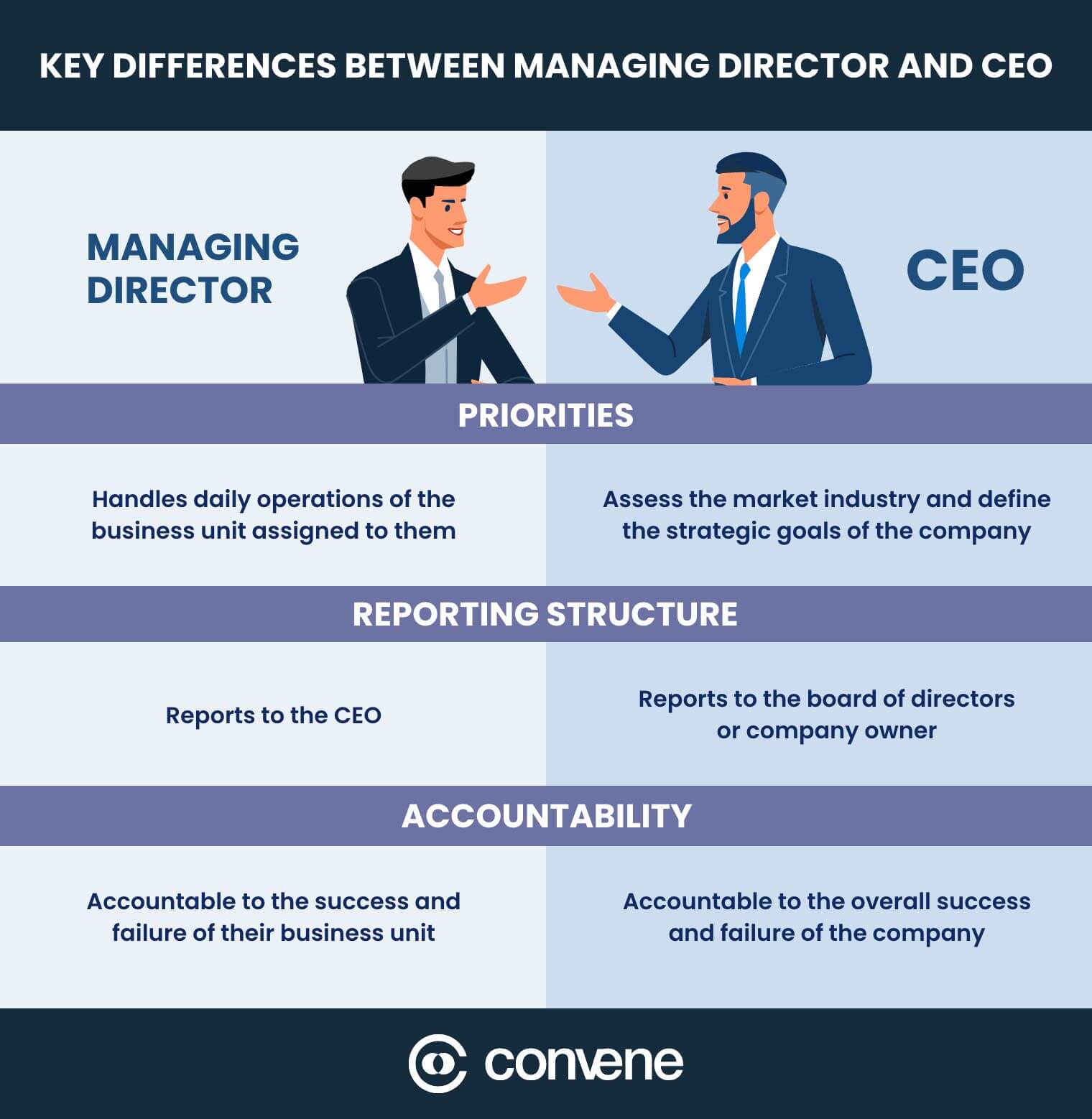Key Takeaways:
- The CEO is the highest senior executive officer who sets the organization’s direction, and is responsible for overall vision, strategy, and company representation.
- On the other hand, the Managing Director is a senior executive officer who ensures operational efficiency by executing strategy, overseeing day-to-day activities, and managing business units.
- The difference between a director and a CEO is that directors govern and set direction, while the CEO executes and drives results.
- Comparing the roles of CEO vs. Managing Director shows that the CEO is the visionary communicator to investors and the public, while the Managing Director is the executor who translates vision into staff action.
What is the difference between a CEO and a managing director?
These roles possess similarities, thus they are sometimes interchanged. But, they have crucial differences that should be understood. In large companies, managing directors are typically responsible for a single business unit, while CEOs oversee operations across multiple divisions.
To ease confusion, this article breaks down the differences between a managing director and a CEO. Have a better grasp of their ranks, roles, responsibilities, and qualifications through our side-by-side comparisons.
What is a managing director (MD)?

A managing director is the highest-ranking senior executive outside of the C-suite. They are responsible for the full operation of a specific business unit or project of the company. Their duties typically include leading daily operations, supervising staff, budgeting, submitting reports, and managing projects.
What does a managing director do?
The role of the managing director is influenced by the company structure and culture. They may be assigned responsibilities that are typically performed by the COO or Vice President, but their primary tasks are mostly as follows:
- Implementation of strategic goals and company policies: Managing directors are accountable for executing the CEO’s strategic goals and implementing company policies in their areas of responsibility. They audit the undertakings of the team, advising on whether or not they are aligned with the short- and long-term goals of the company.
- Lead day-to-day operations: They play a key role in the day-to-day operations of their purview. They lead operational activities, such as employee supervision, product releases, budget proposals, and fieldwork.
- Deliver performance reports: Managing directors report to top-level executives, typically the CEO or board of directors. They provide periodic performance and budget reports to give leaders more insights and assist them with decision-making.
- Promote a positive team culture: Managing directors cultivate a collaborative mindset among their subordinates. They organize team-building activities such as dinners, outings, and game nights to strengthen the team’s camaraderie and rapport inside and outside of the workplace.
Authority
Managing directors have the autonomy to set internal strategies, goals, and processes for their assigned units. They manage and delegate assignments to their subordinates such as project heads, supervisors, and team leads.
Others may infer the difference between managing directors and COOs because of their involvement in the daily operations of companies. Their main difference is their scope of responsibility. Managing directors manage the operations of a business unit, while COOs manage the operations of the entire company. This implies that COOs oversee managing directors.
Qualifications
Many successful managing directors have completed education in business administration, finance, marketing, or similar disciplines. Managing directors, like other high-ranking corporate positions, should exhibit profound industry expertise and a track record of success in management roles.
They must have a comprehensive knowledge of how their assigned unit works and its moving parts to run its operations more effectively. Lastly, they must possess strong competencies in strategy planning, implementation, administration, finance control, staffing, communication, and project management.
What is a chief executive officer (CEO)?

The CEO is the most senior executive in a company and heads the C-level members. They are mainly responsible for forming a strong corporate vision and communicating it to stakeholders. They are constant innovators assessing local and global markets in search of unique business opportunities for expansion.
What does a CEO do?
Unlike the managing director who is directly involved in operations, the CEO is more focused on high-level management responsibilities like:
- Determine strategy and goals: CEOs are visionary and decisive leaders who lay out the long-term strategic direction and goals of a company. They are strategic thinkers who base the decisions they make on market indicators such as demand, economic trends, regulatory changes, and competition.
- Lead the senior management team: As the highest C-level executive, the CEO has the authority to build a team of their choosing, in accordance with the company constitution and qualifications. CEOs also evaluate the work performance of their senior executives to guarantee job quality, both as individuals and as a team.
- Increase overall market value: All the initiatives of a CEO aim to grow the company’s market value. According to a PwC survey conducted in 2023, 40% of CEOs believe their companies will become less profitable in the next decade unless they change direction. The poll additionally shows that CEOs are more cognizant of the need to adapt to evolving markets.
- Represent the company in activities: CEOs play a vital role in shaping public perception of their companies. Their presence at public gatherings helps to make their companies more relatable and approachable. CEOs use these opportunities to interact with stakeholders, demonstrate social responsibility, and position their companies as thought leaders in their industries.
Authority
The CEO is the ultimate decision-maker and has the final say on all major corporate decisions, from resource allocation to employee management to system development. They steer the company’s course, taking into account the market landscape, financial performance, and brand reputation.
The CEO produces a monthly report for the board of directors called the “CEO Report”, which provides a high-level overview of business objectives, progress, and company financials.
Qualifications
CEOs must be decisive leaders with a deep understanding of operations management across all business units. This leadership role requires a solid grasp of the business and industry in order to effectively manage and optimize every department to achieve the vision.
They must demonstrate management competencies like strategic planning, leadership, interpersonal, organizational, analytical, conflict resolution, communications, corporate finance, and governance.
In highly specialized industries, certification and licensing are vital qualifications for becoming a CEO. For example, a litigation firm CEO must be a licensed lawyer, while a service company CEO may need certifications in management and leadership.
Key Differences Between Managing Director and CEO
Here is a side-by-side CEO vs director comparison to help clarify any misconceptions between the two.
Priorities
The CEO is put in the position to deeply assess the market industry and define the company’s strategic vision and objectives based on it. They collaborate with other top executives to seek support with the internal and external execution of these plans.
This is when the managing director enters the picture. A managing director ranks below the CEO and receives particular projects from them. They are responsible for directing daily operations and ensuring that every effort moves their business unit closer to the CEO’s strategies.
Reporting Structure
The CEO reports to the board of directors who oversees the CEO’s management. Despite being the highest authority in the organizational structure, the CEO still needs a unit to keep track of their work to audit the quality and the integrity of their decisions.
On the other hand, the managing director usually reports to the CEO. They are responsible for fulfilling the directives of the CEO through handling daily operations for their unit and reporting on progress and any challenges.
The reporting structure between the CEO, managing director, and board of directors varies depending on company culture. The most common is that the CEO reports to the board of directors, and the managing director reports to the CEO.
Accountability
Managing directors are accountable for the performance of their business unit, while CEOs are accountable for the company’s overall growth. Managing directors actively participate in daily operations and report to the board of directors, while CEOs gather daily operations reports for assessment.
How to become a managing director?
Earning the position of managing director, like any other senior executive role, is a fruit of dedication and extensive professional experience in management and leadership. Here are the recommended steps to qualify as a managing director:
Develop business acumen through education
The first thing needed to qualify is to earn a bachelor’s degree in business or a related field. Business degrees provide a good head start and exposure to core courses, such as administration, human resources, business management, accounting, data analysis, economics, and networking. While a bachelor’s degree is sufficient, continuing education with a graduate or doctoral degree can strengthen a candidate’s qualifications and give them a stronger chance of success.
Gain comprehensive professional experience
Begin gaining relevant experience early on to prepare for a managing director role. Managing directors are versatile professionals who can be placed in any industry or function, so a well-rounded professional foundation is beneficial. A person can start as a management trainee to identify their preferred area of business.
Seek continuous development in essential skills
Show determination by constantly seeking opportunities for growth. Explore formal and informal learning methods to solidify business acumen. Take certification classes and read publications to stay informed on trends. Attend business events to network with industry experts as well as gain valuable insights about corporate governance and operations.
Frequently Asked Questions About Managing Director and CEO
Perhaps there are still many unanswered questions about these roles that need to be explored. Here are the top FAQs about MD vs CEO.
How much does a managing director make?
According to Salary.com, the average annual income in the US of managing directors is 289,658 USD in the US. Salary rates differ by city, but California, New Jersey, Alaska, and Massachusetts have the highest. It ranges from 322, 447 to 315, 235 USD.
Can one person hold both the positions of MD and CEO in a company?
The question of “Is a CEO a director too?” can be answered by a company’s constitution. Startups and smaller companies often have the founders serve as CEO and managing director, especially in the early stages. This is because startups often demand faster decisions, which can be more efficient with a single decision-maker. However, as these companies stabilize, they need to expand their internal structure, which often includes adding senior management, such as C-level executives or a managing director.
Some companies have constitutions that require more than one CEO or MD. In these cases, the CEOs or MDs have split responsibilities that must align with the overarching strategy and ambitions of the company. For example, one CEO may be responsible for internal operations and the other for external operations. These CEOs must coordinate their workflows and communicate regularly to avoid overlap and miscommunication.
How can a company decide whether to appoint an MD or a CEO?
The decision to hire a CEO and a managing director is determined by the board of directors influenced by corporate culture and necessity. For example, the board can call for an election if they identify the current CEO as underperforming. If the new CEO then needs to free up some responsibility to focus on strategy planning, they can discuss it with the board and decide whether they need to appoint a managing director to handle specific aspects of the business.
Is the managing director the same as an executive director?
The managing director and executive director are both senior executives, but they have different roles and responsibilities. The managing director focuses on business operations to execute strategies and implement corporate policies. An executive director is a member of the board, often in non-profit companies, who reports directly to the board president. They sit in board meetings typically to develop strategies and financial plans for the organization.
Perform Management Roles More Effectively with Convene

Managing directors and CEOs form a team to drive operations, with the former focusing on a specific business unit and the latter overseeing multiple units. Their roles differ in scope, but both are essential for a company’s lasting success.
Since their responsibilities mostly involve administration, project management, presentations, meetings, and performance evaluations, it is important for them to be knowledgeable about solutions that can streamline their core duties. Board portals are revolutionary tools for executives and management, centralizing business workflows such as meetings, project assignments, approvals, voting, announcements, and document storage.
Convene is a comprehensive board management software designed to digitize corporate governance from meeting management to streamlining daily workflows. It provides intense security features including automatic security warnings, multi-level encryption, jailbreak and root detection, and multi-factor authentication, reducing susceptibility to risks like fraud and hacking.
Discover the other sophisticated features of Convene by booking a free demo today!
Jean is a Content Marketing Specialist at Convene, with over four years of experience driving brand authority and influence growth through effective B2B content strategies. Eager to deliver impactful results, Jean is a data-driven marketer who combines creativity with analytics. In her downtime, Jean relaxes by watching documentaries and mystery thrillers.












